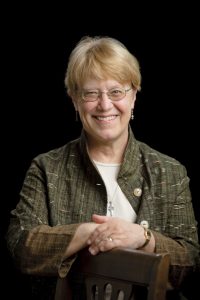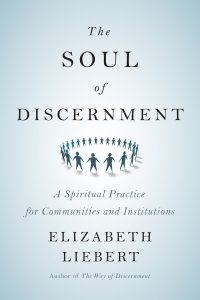 In this interview with Elizabeth Liebert, SNJM, Professor of Spiritual Life and Director of the Program in Christian Spirituality at San Francisco Theological Seminary, Elisabeth Kvernen asks about her recent book, The Soul of Discernment: A Spiritual Practice for Communities and Institutions (Westminister John Knox Press, 2015). In their conversation, Liebert discusses why discernment is central to a vibrant spiritual life, the role of individuals versus systems in the discernment process, and what Pope Francis thinks of this practice. Liebert was a resident scholar at the Collegeville Institute during the Fall of 2013, during which she shared insights on discernment in this video interview.
In this interview with Elizabeth Liebert, SNJM, Professor of Spiritual Life and Director of the Program in Christian Spirituality at San Francisco Theological Seminary, Elisabeth Kvernen asks about her recent book, The Soul of Discernment: A Spiritual Practice for Communities and Institutions (Westminister John Knox Press, 2015). In their conversation, Liebert discusses why discernment is central to a vibrant spiritual life, the role of individuals versus systems in the discernment process, and what Pope Francis thinks of this practice. Liebert was a resident scholar at the Collegeville Institute during the Fall of 2013, during which she shared insights on discernment in this video interview.
How do you define discernment? How is discernment different from “deciding” or “judging”?
Discernment is a name that the Christian tradition gives to the various processes in which individuals and groups search for the presence and the call of God. It comes from the Latin discernere, meaning “to separate, set apart, divide, distribute, distinguish.” As Christians, we discriminate, judge, or separate the voice of God from other voices so that we can continually follow God’s call. We may search for God in the midst of our daily lives as we read Scripture, sort out the various voices of our culture, seek out our vocations, and so on.
Discernment in decision-making is the process of looking for God in the act of making a decision; in this case, the decision is the context for the discernment. The discernment question in decision-making is some form of “How is God calling me to act in this situation?” or, “Of the choices open to me, which is the better option?” Judging and deciding can happen about anything, but discernment is judging and deciding in the context of seeking God in the moment. Bringing discernment into the context of decision-making means putting the search for God at the heart of the decision.
Why have you chosen to spend so many years studying the individual and social dimensions of this practice?
 It has always seemed to me that discernment is the key to the spiritual life—how can I sense that God is with me? That God is calling me, inviting me, to act, to stretch, to interact with others, to grow to full maturity in Christ?
It has always seemed to me that discernment is the key to the spiritual life—how can I sense that God is with me? That God is calling me, inviting me, to act, to stretch, to interact with others, to grow to full maturity in Christ?
I have spent many years receiving spiritual direction, as well as offering spiritual direction to others, and teaching this ministry to others. In spiritual direction, the seeker and the director are listening together for how God is present and inviting the seeker to grow and to become more fully alive in Christ. One of the greatest gifts my spiritual directors have given me over the years is to help me become a discerning person in my own right. So I, in my turn, want to give this gift of becoming a discerning person to everyone I accompany in spiritual direction. I want every directee to develop a sense of how to listen for God and to become increasingly fluent in noticing how God is at work in their personal lives, in their relationships, and in the systems within which they dwell.
You have extended your study of individual discernment into the realm of systems. What does that mean? Why did you decide to move to a systems approach?
The various forms of discernment within the tradition—and there are many, each arising from different contexts—focus primarily on helping individuals sense how God is calling them. The “data” for this discernment is heavily internal: thoughts, feelings, imaginings, intuitions are all the “stuff” of discernment. Any attention paid to the external world is usually limited to those relationships close to the discerner—family, friends, work groups, church communities and the like. Group discernment has extended these individual processes so that the gathered group asks these kinds of questions about how God is calling the group. But the “stuff” of discernment is still the thoughts, feelings, imaginings and intuitions of the members of the individuals in the group.
Today, however, we are more aware of the overlapping and extremely complex systems in which we live, and that we are not, and never were, autonomous individuals. Our families, our work, our culture, our language, our neighborhood and regional geographies, our ethnic heritage, the economy, government at multiple levels—all of these are a part of who we are as we ponder how God might be calling us. Our bodies, likewise, are part of living systems embedded in larger living systems affected by non-living systems. Indeed, the largest system, the one that we can never stand apart from, is the universe itself.
What does it mean that our existence is embedded in multiple systems simultaneously? The first thing we recognize when we ask this question is that systems behave differently than individuals, following system rules rather than human logic. We might also notice that our actions may have (apparently) no influence on the system, depending on the system’s size and complexity, causing us to ask why bother with discernment at all? What we need in this case is a renewed theology that recognizes how systems function within God’s plan.
A third reality that becomes obvious when we look at systems is that they preserve themselves and the behaviors that created them. That reality means, at least, that if we want to impact a system so that it is a better reflection of God’s desires for the world, we need to know how the system behaves. If we want to bring about more justice in the world, we need to understand how it is that systems maintain unjust realities, even though individuals within them are themselves seeking justice. Something more is needed than good will and individual action.
In light of these system realities, I wanted to ask how discernment might proceed when we take systems seriously as systems. I also wanted to focus on the question, “How is God calling this system?” as well as “How is God calling me to act as a participant in this system?”
Can you give an example of an individual or organization that has benefited from a systems discernment process?
 One of my earliest experiences, now quite some years ago, occurred when the pastor of a small congregational church asked me to help its members discern the direction for their church. They had recently purchased a vacant bank building in the heart of their small community, and were planning to house their ministries, church office, meeting and worship space in their new building, when they discovered that the zoning rules did not allow worship to be conducted in that building (which was a failure to look closely at the local legal system of zoning regulations). The resulting turmoil made them question their earlier discernment, and exposed a longstanding internal difference that flared up in the resulting climate of finger-pointing.
One of my earliest experiences, now quite some years ago, occurred when the pastor of a small congregational church asked me to help its members discern the direction for their church. They had recently purchased a vacant bank building in the heart of their small community, and were planning to house their ministries, church office, meeting and worship space in their new building, when they discovered that the zoning rules did not allow worship to be conducted in that building (which was a failure to look closely at the local legal system of zoning regulations). The resulting turmoil made them question their earlier discernment, and exposed a longstanding internal difference that flared up in the resulting climate of finger-pointing.
The congregation was sufficiently divided that it could split. They had already carefully analyzed the community when they made the decision to move their church into the center of town, but they had neglected to reflect on the system of their own church community which harbored a significant internal tension. At the point my work with them concluded, they were engaged in a year of pastoral visitation among themselves, asking questions about how each member individually, and how the church as a whole, was called in this new situation. Eventually they sold the bank building, when it became clear that splitting worship from ministry was not the way they were being called to go forward. The way did not magically open for them, but they were able to come together and trust the process and themselves to find the way forward with a new unity.
What are some of the challenges inherent in practicing discernment in the context of a community or institution?
As with all discernment, it can sometimes be difficult to trust that God is in charge and will lead us, as we do the inner work of preparing to move where God is calling. Everybody involved in the discernment will not be of one mind and heart, so it can take a lot of respectful listening and deep sharing to come to the place of trusting one’s fellow discerners. We can be tempted to jettison as “unspiritual” or too time-consuming the legwork entailed in social analysis. The entire social discernment process is long and may be quite complicated, a difficulty for those who want clear, quick answers. We can be tempted to imitate the corporate culture in our desire to move as quickly as possible toward action, rather than committing ourselves to the long, slow, attention to God and God’s work in us and in the structure. We can look for a simple, clear direction, and be disappointed when what opens up is but the first step of many. On the other hand, we can get lost in endless study and never move to a decision and action. But what can come from the process, through grace, is a profound conversion that happens as we seek God in and through our system, one step at a time.
In Amoris Laetitia the pope speaks a great deal about discernment. Do you see discernment as important to Pope Francis?
Absolutely! Francis, is after all, a son of Ignatius of Loyola, who has offered one of the most useful systems for discernment in the Western church. Two things immediately stand out in Amoris Laetitia. The first is how frequently he recommends that bishops discern about the local church, recognizing that one perspective delivered from “on high” will not serve varying local churches equally well. He commends discernment to clergy and other ministers working pastorally with individual congregants, whether preparing for marriage, struggling with failed or failing marriages, or in second unions. Finally, he recommends discernment to individual persons about their own situations, recognizing that conscience formation is crucial to prayerful choices. He assumes that the concrete reality on the ground must enter into all decisions and that the process of weighing and searching for the better option in the concrete situation is absolutely required—the definition of discernment.
Second, I am struck by how close the process leading to Amoris Laetetia is to Social Discernment. Francis started by naming the pastoral problem: families are in crisis. He then framed the question that flows from the problem: what should the church’s responsibility be to families in this day and age? He called a synod to focus on the family, and, although not representative of the whole church, at least it gathered bishops from around the world. He asked for a social analysis by asking all bishops directly or through their conferences to survey the persons in their local church about their experiences related to family. He called together the second synod, in which the bishops weighed, judged, argued, prayed and eventually produced a document—which Francis immediately made public. It’s as if Francis wanted to indicate how seriously he took the consultation. Francis himself provided theological reflection about the issues facing the family in several of the chapters of Amoris Laetetia. He doesn’t simply want to issue an edict, but to assist conscience formation and discernment of these complex and charged issues. All of us, then, are all invited to continue discerning these complex situations surrounding contemporary families.
Like this post? Subscribe to have new posts sent to you by email the same day they are posted.



Was looking for some takes regarding this topic and I found your article quite informative. It has given me a fresh perspective on the topic tackled. Thanks!
I hope you can take the time to read my post as well Essential Principles of Spiritual Discernment